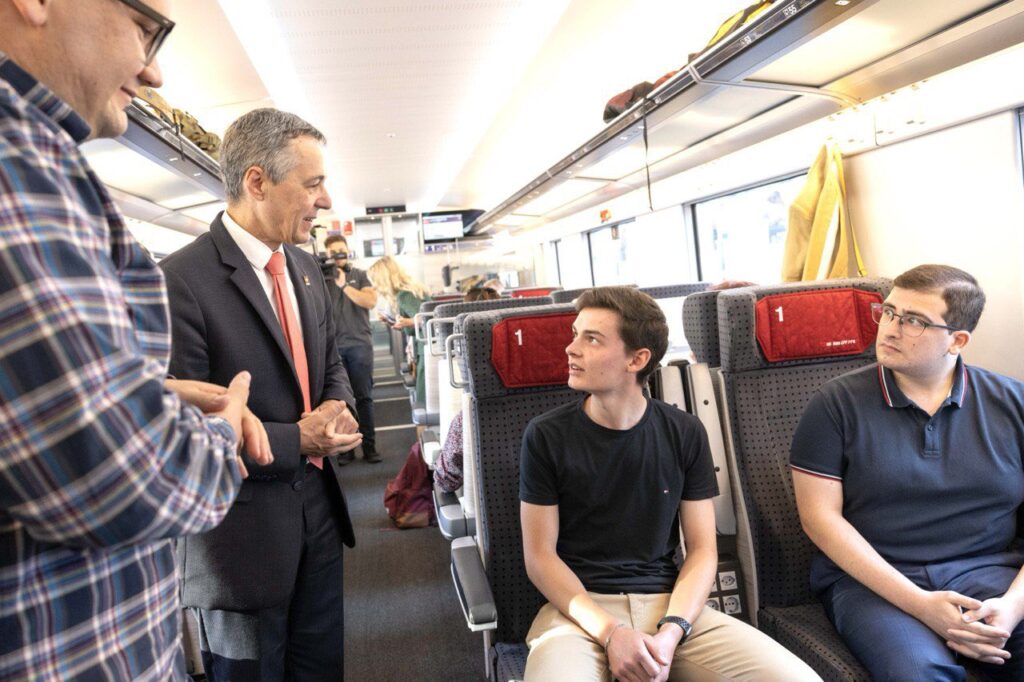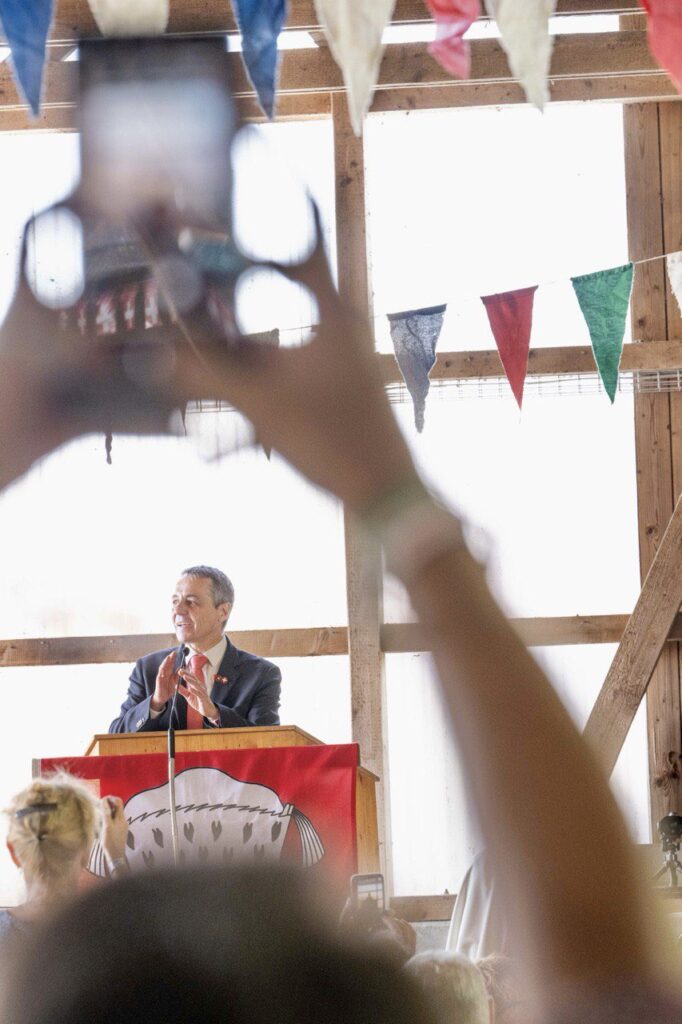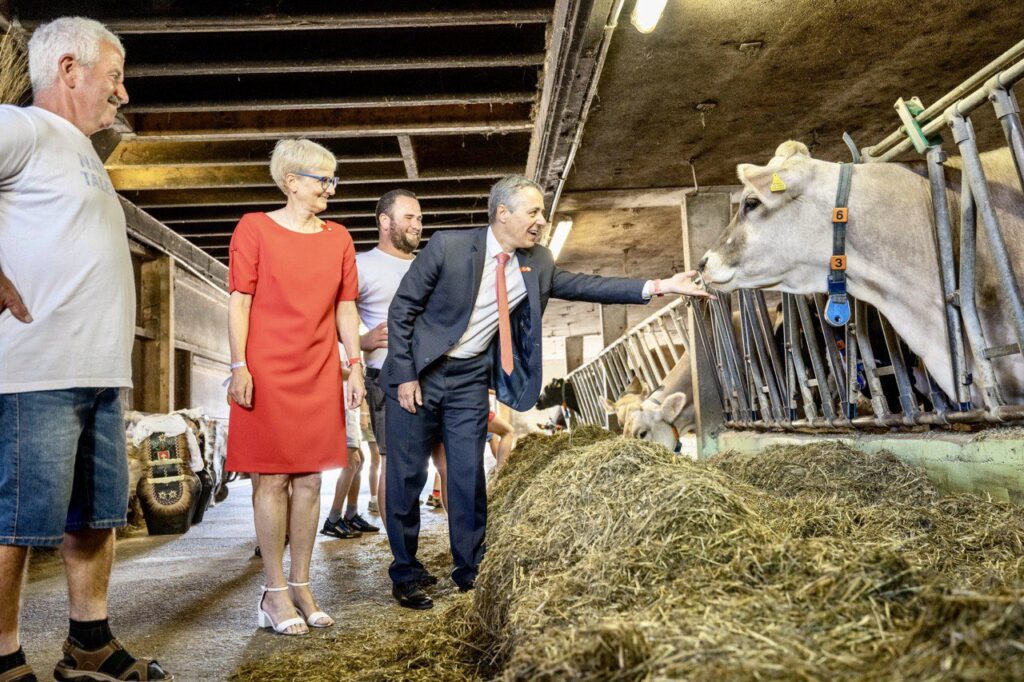Celebration of August 1, 2022: Speech by Federal President Ignazio Cassis in Knonau
Federal President Ignatius Cassis (FDP) made the first stop of his “Tour de Suisse” by train in Knonau, Canton Zurich at the Stöckweid farm and spoke about how nothing can be taken for granted in today’s world.

Mr. Director of the Swiss Farmers’ Union
Mr. President of the Zurich Farmers’ Union
Representative of the Farmers’ Union
Dear guests
Thank you very much for your welcome. I am very pleased to be with you today at Stöckweid Farm.
It is the first stop on my August 1 tour. I started my journey this morning by train from Lugano. I will conclude my “Tour de Suisse” this evening in Lausanne. As President of the Confederation, this year I wanted to take a journey through Swiss history. I wanted to visit symbolic places, once witnesses of crisis, but above all of reconciliation. In doing so, I wanted to emphasize two important pillars of our country: our capacity for reconciliation and our unity. These values should inspire us today as well.
Background
At the beginning of my year as president, we hoped for an early end to the pandemic. After two years of restrictions, we longed for normalcy. And indeed: in February we finally saw light on the horizon. The virus has not disappeared, but we have learned to live with it.
What was unimaginable, however, was that the war would return to Europe this year. A terrible war. A war that would cause an incredible amount of suffering and destruction. Who could have imagined that millions of women and children would be fleeing to Europe? Who could have imagined that issues such as security policy in Europe, the military or neutrality would return to dominate public debate? And who would have thought that in the middle of summer we would be afraid of energy shortages in winter? The Covid crisis has already had serious consequences: an unstable economic situation, disrupted supply chains, indebtedness due to state intervention, and, on this basis, inflation that threatens to reduce the purchasing power of many households. All these challenges have been further exacerbated by the war.
The world we lived in two and a half years ago was indeed different. Since the outbreak of the pandemic, we have been living in a prolonged crisis mode. To speak of a momentous turning point is hardly an exaggeration. The reality has surpassed our imagination. I am even happier that today we can celebrate August 1 together. Especially because these crises strengthen the sense of home. It is wonderful to live in a country where freedom, security, peace and democracy shape our common concept of home. In a country where diversity means wealth and is not understood as a threat. Although history teaches us that this journey has not always been easy. But it is precisely this Switzerland – a Switzerland that has successfully faced this journey – that I would like to celebrate with you.

Conflict and reconciliation
Ladies and gentlemen
The journey I began this morning in Lugano is meant to remind us where we come from and where we are today. We must not forget that Switzerland has also experienced many crises and conflicts throughout its history. Switzerland was born as a reaction to its powerful expansionist neighbors.
Our ancestors fought to preserve themselves. They formed alliances to be stronger and defend their independence. Often they won, but sometimes they chose the wrong side. They had to and could negotiate to secure advancement and territory. Even then, Europe benefited from a stable and secure Switzerland, guarantor of the transportation and trade routes that form the backbone of the continent. Of course, geographic location is an important protective factor, but that is not all: Switzerland developed through its own efforts the capacity for self-assertion and strength that it can still count on today. We have always found a way to reconcile. Two historical examples that happened not far from here clearly demonstrate this.I did not decide to stop in Knonau by accident.
We are in the area that was the scene of the two Kappeler Wars (1529/1531) and then the Sonderbund War (1847). Two turning points in Swiss history that shook our country. But they were also turning points that convinced the quarreling localities to overcome their cultural conflicts and found modern Switzerland together. This was not a foregone conclusion considering the differences in culture and mentality. Recall that in 1847 the National Assembly decided-not without discussion-to send precisely a Genevan to resolve this conflict. The name of this Genevan? Henri Dufour.
Conflict and reconciliation are also the themes of my next stop: the industrial and watchmaking town of Grenchen, in the canton of Solothurn. Here we remember the workers’ struggles and the national strike of 1918, one of the greatest political and social crises in our federal state. In Grenchen, the strike ended with the death of three workers. They were killed by soldiers. Following this period of social tensions, industrial peace was concluded in 1937, which acquired identity significance in Switzerland, as did neutrality.
These moments in Swiss history remind us that peace and stability come at a price. They can never be taken for granted. Their preservation requires commitment and dialogue. It is important to me that we all remember this in these uncertain times – especially the young people here, some of whom have been with me since Lugano. I am convinced that the world today needs more “Swissness.” I am also committed to this as Foreign Minister, and I trust that you will uphold these values with great vigor, today and in the future.
Because I believe deeply in the unifying power of Switzerland, I have decided to hold the conference on the reconstruction of Ukraine in our country as well. Together with 40 countries and 20 international delegations, we presented our reasons for the peace process in Ticino at the beginning of July and made them concrete by signing the Lugano Declaration. Of course, we are only at the beginning of a complicated process. We still have a long way to go before the guns fall silent and stability returns to Europe. But Switzerland is on the spot: strong and determined, we carry this momentum with us and are ready to bring our values and diplomatic know-how to the international stage.
Switzerland prepares to celebrate its birthday
Values and diversity
Dear Participants
How can we celebrate Switzerland in the current context? How can we live up to our values and the diversity of our country in these times?
If one wants to understand Switzerland, one must get closer to it. For me, as a Ticinese, and for many other Ticinese, this step became necessary very early on. Also because of the mountainous barrier – quite beautiful – that separates us from the rest of the country. This barrier makes Ticino a unique region in Switzerland, but it also distinguishes it a bit. And it requires us to make an effort in terms of time, language and culture to reach out to others – you.
Today, however, I do not want to talk primarily about effort, but about responsibility. I feel a deep need for unity. A unity that is especially important nowadays. That is why my August 1 trip to Switzerland means so much to me.
The Covid pandemic and the war in Ukraine have shown in different ways that solidarity increases in crisis. The clashes have paradoxically brought us closer together, forcing us to take better care of each other. Similarly, the war in Europe has unleashed a great wave of willingness to help. “Even when divided, Switzerland remains united.” An odd phrase, you might think. Yet this willingness to reconcile runs through the entire history of Switzerland’s origins.
Remain united: This is what we have learned here in our country, in the heart of Europe, a meeting place of four languages and cultures. And that is what I would like to celebrate this year as President of the Swiss Confederation: our ability to live together and to reach out to one another. And I am not just thinking of the vacation season, when many of you rush below the Alps to reappear in the Ticino sunshine. I am thinking of the diversity we encounter in our streets, universities, schools, workplaces and homes. The diversity we encounter in train stations at rush hour. Stations that play a central role in my life and my political career. Train stations-these very points of arrival and departure-have been a powerful symbol during the pandemic of how Covid has brought our society to a standstill. Train stations are meeting points. They are nodes in the rail network that connects us.
And this year we also celebrate the 175th birthday of the Swiss railways. Railways are the calling card of a modern and efficient Switzerland, more interconnected than almost any other country. Just imagine: In a few hours you can go from a remote valley in Valais to Milan, with virtually no waiting time. Connections work, even if they sometimes fall victim to their own success. This excellent accessibility, despite the difficult relief, is the result of a series of technical and human masterpieces throughout our history, which I am happy to benefit from even today.
Swiss Railways celebrates 175 years

Culture and modernity
Dear guests
The last leg of my train journey takes me to Lausanne in western Switzerland, the final stop on my August 1 tour. Lausanne, the “Olympic capital” of Vaud, has been under Bernese rule for more than two centuries. Today Lausanne is a meeting place between city and country, tradition and modernity.
An occasion to recall the words of a famous Vauder-not those of my colleague Guy Parmelin, but those of Jean-Pascal Delamuraz: “Les Suisses s’entendent bien car ils ne se comprennent pas.” The Swiss get along because they do not understand each other. That is somewhat true, but it is not only that. I think we get along mostly because we are all proud of our diversity and particularities. The secret of our coexistence lies in our shared pride in our uniqueness.
The proof is in my closing question: in what other country could a president take a train, visit three language regions in one day and celebrate his country’s birthday together with the people? This is part of our culture. It is our DNA. We have internalized this self-image for generations. So much so that it sometimes seems obvious to us. But we must never forget where we come from. We must never forget what a great opportunity our uniqueness is.
I thank you for your attention and wish you a happy National Day. Long live Switzerland!
Source: Admin.ch





